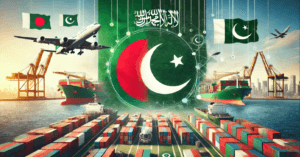Bangladesh-Pakistan Relations: A New Chapter Amid Changing Political Landscape
Recent political changes in Bangladesh, including the removal of Sheikh Hasina, have led to improving ties with Pakistan. Bangladesh and Pakistan resumed direct trade, with Dhaka importing 50,000 tonnes of rice in February, alongside restoring direct flights, military cooperation, and simplified visa procedures. India is closely monitoring these developments due to security concerns and its historically strained relationship with Pakistan. Some experts believe Bangladesh and Pakistan are aligning strategically to counterbalance India’s influence.
Military ties have strengthened, with Bangladeshi delegations visiting Pakistan and participating in naval exercises. However, historical tensions remain unresolved, as Bangladesh continues to demand an apology from Pakistan for the 1971 war, while Pakistani officials argue Bangladesh must also address violence against Urdu-speaking Biharis.
Despite political and military developments, economic potential exists, with Pakistan’s large population providing a strong market for Bangladeshi exports, though high tariffs and travel restrictions remain challenges. Pakistan’s foreign minister is scheduled to visit Dhaka in April, while Bangladesh’s upcoming elections may further shift its foreign policy. India views a stable Bangladesh as crucial for regional security and is closely watching these diplomatic changes.

Bangladesh-Pakistan Relations: A New Chapter Amid Changing Political Landscape
Recent political shifts in Bangladesh, including the removal of former Prime Minister Sheikh Hasina, have led to unexpected developments, particularly in the country’s relationship with Pakistan. After years of strained ties, the two nations are now moving closer, signaling a major shift in regional dynamics.
For the first time in decades, Bangladesh and Pakistan have resumed direct trade. In February, Bangladesh imported 50,000 tonnes of rice from Pakistan, marking the beginning of a new economic relationship. Alongside trade, direct flights between the two countries have been reinstated, military cooperation is expanding, and visa procedures have been simplified. Talks of collaboration on security matters further indicate a broader partnership. This growing engagement is significant given their turbulent history. Bangladesh, formerly East Pakistan, gained independence in 1971 after a violent conflict with the support of India.
While diplomatic ties between Bangladesh and Pakistan improved between 2001 and 2006, relations cooled under Sheikh Hasina’s leadership due to her government’s close alignment with India. However, following her removal and subsequent refuge in India, Bangladesh’s foreign policy has taken a new direction, opening doors to stronger ties with Pakistan.
India is closely monitoring these developments, particularly as Bangladesh and Pakistan strengthen diplomatic and military relations. Some experts suggest this renewed partnership is a strategic move aimed at counterbalancing India’s influence in the region. Pakistani academic Ayesha Siddiqa believes that both countries may be seeking to reduce India’s dominance. Military cooperation between Bangladesh and Pakistan has also intensified. Earlier this year, a high-level Bangladeshi military delegation visited Pakistan, and the Bangladeshi Navy participated in a multinational maritime exercise led by Pakistan.
These developments have raised concerns in India, which has long accused Pakistan’s intelligence agency, ISI, of supporting insurgent groups in India’s northeast—an allegation both Pakistan and Bangladesh deny. Nevertheless, the growing ties between the two nations have heightened India’s unease.
Despite recent diplomatic progress, unresolved historical tensions remain. Bangladesh has repeatedly demanded a formal apology from Pakistan for the atrocities committed during the 1971 war, in which hundreds of thousands of Bengalis were killed and many women subjected to violence. Pakistan, however, has shown little willingness to apologize. Some Pakistani officials acknowledge this as a major barrier to improving relations. Retired army officer Ikram Sehgal suggests that while Pakistan should admit its past mistakes, Bangladesh should also recognize the violence inflicted on Urdu-speaking Biharis during the war. These lingering grievances underscore the complexity of their relationship, even as both nations pursue closer ties.
While political and military developments dominate headlines, economic experts argue that trade presents the most practical path forward. With Pakistan’s population exceeding 250 million, it offers a major potential market for Bangladeshi exports. However, high tariffs and travel restrictions continue to hinder business opportunities. Pakistan’s Foreign Minister, Ishaq Dar, is scheduled to visit Bangladesh in April to discuss these issues, and with general elections expected in Bangladesh later this year, a new government could further influence the country’s foreign policy, potentially reshaping regional alliances.
For India, maintaining a stable and friendly relationship with Bangladesh is essential, particularly for the security of its northeastern states. As Bangladesh redefines its alliances, India is watching closely to assess how these changes will impact regional stability. The strengthening ties between Bangladesh and Pakistan present a challenge to India’s influence, making it imperative for New Delhi to navigate this evolving geopolitical landscape carefully.
In conclusion, the warming of relations between Bangladesh and Pakistan marks a significant shift in South Asian geopolitics. While trade and diplomacy are fostering new opportunities, historical tensions and strategic concerns remain critical factors shaping this relationship. As both nations explore deeper collaboration, the broader implications for regional stability and India’s role in South Asia remain key areas of focus.
You must be logged in to post a comment.